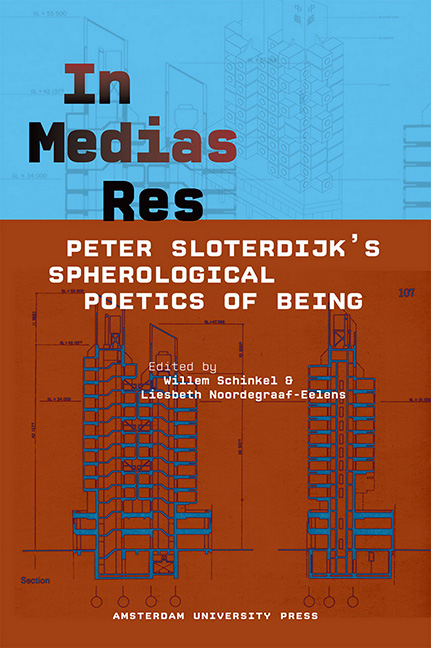Book contents
- Frontmatter
- Contents
- 1 Peter Sloterdijk’s Spherological Acrobatics: An Exercise in Introduction
- 2 Foamy Business: On the Organizational Politics of Atmospheres
- 3 “Transgenous Philosophy”: Post-humanism, Anthropotechnics and the Poetics of Natal Difference
- 4 Disinhibition, Subjectivity and Pride. Or: Guess Who Is Looking?: Peter Sloterdijk’s reconstruction of ‘thymotic’ qualities, psychoanalysis and the question of spectatorship
- 5 Sloterdijk and the Question of an Aesthetic
- 6 Uneasy Places. Monotheism, Christianity, and the Dynamic of the Unlikely in Sloterdijk’s Work – Context and Debate
- 7 The Attention Regime: On Mass Media and the Information Society
- 8 In the Beginning was the Accident: The Crystal Palace as a Cultural Catastrophe and the Emergence of the Cosmic Misfit: A critical approach to Peter Sloterdijk’s Weltinnenraum des Kapitals vs. Fyodor M. Dostoevsky’s Notes from the underground
- 9 A Cautious Prometheus? A Few Steps Toward a Philosophy of Design with Special Attention to Peter Sloterdijk
- 10 Sloterdijk and the Question of Action
- 11 The Space of Global Capitalism and its Imaginary Imperialism: An Interview with Peter Sloterdijk
- Contributors
- Index
4 - Disinhibition, Subjectivity and Pride. Or: Guess Who Is Looking?: Peter Sloterdijk’s reconstruction of ‘thymotic’ qualities, psychoanalysis and the question of spectatorship
Published online by Cambridge University Press: 23 June 2021
- Frontmatter
- Contents
- 1 Peter Sloterdijk’s Spherological Acrobatics: An Exercise in Introduction
- 2 Foamy Business: On the Organizational Politics of Atmospheres
- 3 “Transgenous Philosophy”: Post-humanism, Anthropotechnics and the Poetics of Natal Difference
- 4 Disinhibition, Subjectivity and Pride. Or: Guess Who Is Looking?: Peter Sloterdijk’s reconstruction of ‘thymotic’ qualities, psychoanalysis and the question of spectatorship
- 5 Sloterdijk and the Question of an Aesthetic
- 6 Uneasy Places. Monotheism, Christianity, and the Dynamic of the Unlikely in Sloterdijk’s Work – Context and Debate
- 7 The Attention Regime: On Mass Media and the Information Society
- 8 In the Beginning was the Accident: The Crystal Palace as a Cultural Catastrophe and the Emergence of the Cosmic Misfit: A critical approach to Peter Sloterdijk’s Weltinnenraum des Kapitals vs. Fyodor M. Dostoevsky’s Notes from the underground
- 9 A Cautious Prometheus? A Few Steps Toward a Philosophy of Design with Special Attention to Peter Sloterdijk
- 10 Sloterdijk and the Question of Action
- 11 The Space of Global Capitalism and its Imaginary Imperialism: An Interview with Peter Sloterdijk
- Contributors
- Index
Summary
No pride today
A distinctive mark of Peter Sloterdijk's philosophy, especially within the context of the German tradition, seems to be its striking serenity. Sloterdijk is obviously amused by what he observes (for example, postmodern cynicism), and he comments about it with a polite smile reflecting something between a certain kind of love and a slight contempt for a more or less silly object. This detached attitude appears to save psychic energy and to subsequently allow for a pleasurable release in beautiful and witty poetic verbalizations. So even where Sloterdijk is sharply critical, he is never passionate. This has apparently made him popular and readable even for people who may otherwise stay away from philosophy. It is the reason why some of his “disinvolved” findings have generated more debate and social concern than any “alarmist” criticism would have been able to. And it may also explain why traditional critical academia in Germany finds it difficult to deal with his work.
In keeping with the notorious distinction introduced by Bernard de Mandeville in 1705, one can thus say that Sloterdijk succeeds in always taking the side of the “knave”, but never that of the “fool”. His “criticism” means that he is objectively assessing the structure, i. e., the rationality, necessity, function and power of his object; but never complaining or taking it to task for its impossibilities or lacks compared to an imagined subjective model. He then expresses his findings in a way that allows for amazing clarity and considerable amusement but little identification; and not vice versa. “Whether you like it or not” – such a way of speaking represents a remarkably civilized attitude which does not “bribe” the reader with a favourable opinion, nor bother him with subjective sentimentalities such as vague hopes, wishes, disappointments or angers. This is a rare achievement. We should not forget that, within German culture, after the hopes for bourgeois revolution were dashed, civilizedness was not regarded as a high virtue (as Norbert Elias has pointed out).
- Type
- Chapter
- Information
- In Medias ResPeter Sloterdijk's Spherological Poetics of Being, pp. 67 - 82Publisher: Amsterdam University PressPrint publication year: 2012



